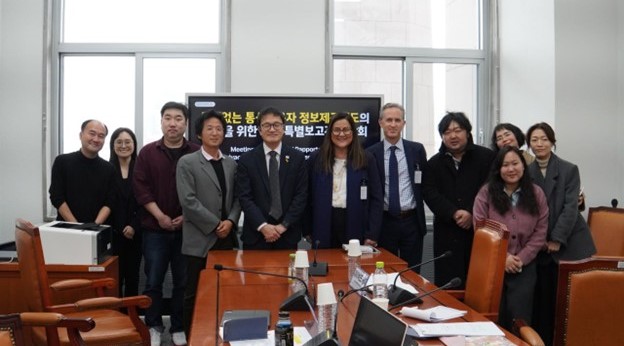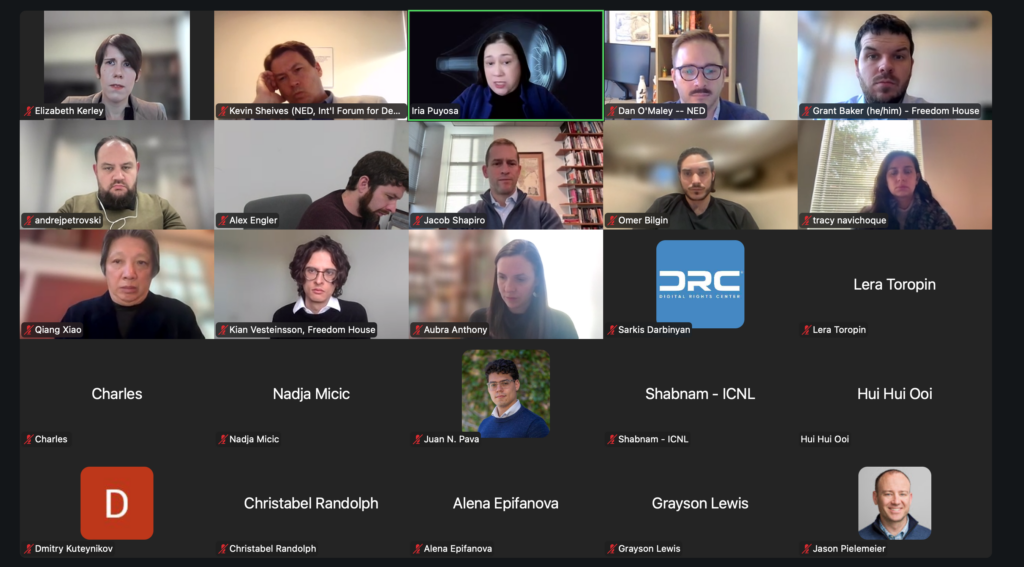1. Ana Brian Nougrères, UN Special Rapporteur on the right to privacy, sent an allegation letter (AL KOR 1/2025) to the Korean government on May 1, 2025, alleging that the system for providing telecommunications user information under the Telecommunications Business Act violates international human rights law, including the International Covenant on Civil and Political Rights (hereinafter “ICCPR”). The letter was sent after the Special Rapporteur reviewed information collected during her informal visit to Korea on February 28, when she held meetings with members of the National Assembly, seminars, and civil society consultations (related content: https://www.opennetkorea.org/en/wp/6908), and was made public in July after the 60-day confidentiality period.

Hosted by Ana Brian Nougrères, Special Rapporteur on Privacy, David Kaye, former Special Rapporteur on Freedom of Expression, and Park Joomin, Chair of the National Assembly Health and Welfare Committee, with participation from experts including National Assembly Science, ICT, Broadcasting and Communications Committee member Hwang Jungah, Park Kyungsin, Director of OpenNet, and Oh Byoung-il, Director of Jinbo Net
2. An allegation letter is an official communication sent by a Special Rapporteur, who is delegated authority by the UN Human Rights Council to monitor human rights situations, to a member state to end ongoing human rights violations. The member state has 60 days to respond to the letter, and after that period ends, it is made public along with the response. During the 60-day period, the Korean government did not respond to the matters requested by the Special Rapporteur in the letter.
3. Through the allegation letter, the Special Rapporteur cited as a particularly concerning example the case where prosecutors collected telecommunications user information of over 3,000 people, including journalists, under the pretext of investigating defamation charges against former President Yoon Suk Yeol in 2023. At that time, prosecutors indiscriminately collected telecommunications user information from civil society activists, ordinary citizens, and politicians who had no direct connection to the case, all under the justification of investigating defamation against one person, former President Yoon Suk Yeol. They also arbitrarily delayed notification of the provision of telecommunications user information for the maximum legal period of six months. Information rights civil society organizations demanded that prosecutors clarify the truth and punish those responsible, but prosecutors took no action and closed the defamation investigation on their own before the presidential election.
4. Furthermore, while the Special Rapporteur welcomed the introduction of the post-notification system through the Constitutional Court’s decision of constitutional nonconformity in 2022, she expressed serious concern that the current Telecommunications Business Act still appears to violate the right to privacy guaranteed by Article 17 of the ICCPR. The Special Rapporteur emphasized that the Telecommunications Business Act still allows investigative agencies to collect telecommunications user information without a warrant, and pointed out that the Act, which permits warrantless collection of telecommunications user information, may violate Article 17 of the ICCPR, which guarantees the right to privacy, and Article 14 of the ICCPR, which guarantees due process.
5. The Special Rapporteur requested that the Korean government provide: ▲ additional information and comments on the alleged facts ▲ an explanation of whether the current Telecommunications Business Act complies with international human rights law by adhering to principles of legality, transparency, and proportionality ▲ measures taken to prevent abuse of the Telecommunications Business Act against journalists, activists, human rights defenders, and political opposition ▲ information on investigations of political critics and the status of retention of collected information. However, to date, the Korean government has not submitted an official response to the Special Rapporteur.
6. For reference, the UN Human Rights Committee also recommended in its concluding observations on the Fourth Periodic Report of the Republic of Korea in 2015 that the telecommunications user information provision system (then called the “telecommunications data provision system”) should be based on warrants. Former UN Special Rapporteur on Privacy Joseph Cannataci also recommended control of telecommunications user information provision through warrants in his 2019 country visit report to Korea. Both the multilateral treaty body overseeing international human rights law and the UN Human Rights Council’s special procedures have already recommended that our country reform its telecommunications user information provision system.
7. This allegation letter is highly significant in that it reaffirmed the fundamental principle of international human rights law that the warrant requirement is essential when states collect telecommunications user information for criminal investigations, and indirectly confirmed the responsibility of prosecutors who indiscriminately collected telecommunications user information without warrants under the pretext of investigating defamation charges against former President Yoon Suk Yeol. It also confirmed that the 2022 Constitutional Court decision, which deemed the post-notification system alone sufficient, does not comply with international human rights law. The government and the National Assembly need to promptly amend the Telecommunications Business Act, which, as the Special Rapporteur pointed out, does not conform to international human rights law.

0 Comments